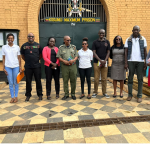- Toll Free: 0800720640
- info@nlas.go.ke
Alternative Dispute Resolution
ALTERNATIVE DISPUTE RESOLUTION
Section 7 (1)(j) of the Legal Aid 2016 mandates the National Legal Aid Service (NLAS) to promote and facilitate the settlement of disputes through Alternative Dispute Resolution (ADR). This is in accordance with Article 159 (2)(c) of the Constitution of Kenya which provides that in exercising judicial authority, the courts and tribunals shall promote alternative forms of dispute resolution including reconciliation, mediation, arbitration and traditional dispute resolution mechanisms.
1.What is ADR?
Alternative dispute resolution (ADR) is the mechanism of resolving disputes in any other form other than through the court process. Alternative justice processes include mediation, conciliation, negotiation, arbitration and traditional dispute resolution mechanisms. The Legal Aid Act defines Alternative dispute resolution as a means of settling disputes through negotiation, mediation, arbitration, conciliation and other informal dispute resolution mechanisms.
2.What methods are used by NLAS for ADR?
Mediation is the most commonly used dispute resolution mechanism by NLAS. It is the process through which the parties to a dispute meet with a neutral third-party, called a Mediator, in an effort to settle the dispute.
3.How does NLAS undertake mediation?
The Mediator listens to the evidence provided by the parties; helps the parties come to understand each other's viewpoint regarding the dispute. The mediator then facilitates a voluntary resolution of the dispute. The advantage of mediation process is that it eliminates the court processes, reduces the time taken in settling a matter and reduces the expenses associated with the court processes.
4.Does NLAS undertake virtual mediations?
With the advancement of technology, NLAS uses Online Dispute Resolution (ODR) in select cases to facilitate ADR processes. Virtual mediation sessions, negotiation meetings and hearings are conducted through internet enabled mechanisms making it more convenient and accessible for clients, especially those who face geographical and or financial barriers. 5.Does NLAS support Alternative Justice Systems?
Alternative Justice Systems (AJS) are the non-state mechanisms of laws, norms, customs, social and legal systems that govern and regulate the activities and lives of individuals in. NLAS supports Alternative Justice Systems by incorporating the use of traditional and informal dispute resolution mechanisms which are acceptable within different communities.



